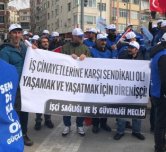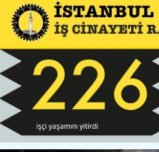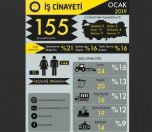Click to read the article in Turkish / Kurdish
According to the report by the Laborers' Health and Occupational Safety Assembly (İSİG), at least 125 workers lost their lives in occupational homicides in February.
Mentioning the difficulties that women workers face, the İSİG said in this month's report, "Women workers are not 'seen' even if they die in occupational homicides."
Most woman worker deaths occurred in agriculture-forestry branch, where the highest rates of unregistered labor are recorded. The other branches with the most woman worker deaths are textile-leather, commerce-office, health, tourism-accommodation, where long work hours are common and unregistered labor rate is high.
Half of the woman worker deaths occurred because of traffic and transportation accidents. Traffic and transportation accidents are one of the most important causes of occupational homicides in insecure jobs, especially in agriculture.
Male violence at workplace
According to the İSİG's report, woman worker deaths as a result of a man's violence in the workplace or on the road to the workplace have increased in the last years.
In 2018, seven women workers were killed by a man in the same workplace or a man came to the workplace from outside.
75 percent of women workers are unregistered
Most of the killed women workers were not members of a union and at least 75 percent of them was working unregistered, according to the İSİG's report.
The report also said that the Social Security Institutions' (SGK) figures are deficient in terms of occupational homicides, occupational accidents and occupational diseases regarding women workers.
Women work double-time
According to the report, women workers face discrimination in the process of diagnosis process of occupational diseases. Most of the time, they are not diagnosed with occupational disease on the ground that the health problems they face may have occurred because of reasons that are not related to their work.
According to the figures by the Turkish Statistical Institution (TurkStat), working women spend 4 hours and 19 minutes a day for housework. The report said that the women have to "work double-time" because of that.
Women workers experience disorders such as mental burnout, chronic stress, anxiety disorder, cardiovascular diseases, musculoskeletal diseases and chronic fatigue. Besides, depression and stress, which women experience more than men, are not included in the occupational diseases.
125 workers, killed in February
The İSİG February report includes the following information:
- Occupational homicides occurred 43 cities in Turkey and in three countries. Most occupational homicides occurred in İstanbul, Kocaeli, Antalya, Manisa, İzmir, Mersin, Ankara, Elazığ, Kütahya, Muğla and Şanlıurfa provinces.
- Out of the 125 killed workers, 108 were wage-workers (workers and public servants) and 17 were working for themselves (farmers and craftspeople).
- 9 of the killed workers were women. Out of the 116 killed male workers, one were a boy and three were refugee workers.
- Most deaths occurred in the branches of construction, transportation, agriculture, commerce-office, security, mining, food, energy and municipality-general labor.
- The most common causes of death were being crushed/collapses, traffic/transportation accidents, falling down from height and heart attack.
- 123 (98.4 percent) of the killed workers were not members of a union, 2 (1.6 percent) were unionized.
Names of the killed workers in February:
Nurettin Demir, Recep Aktaş, Halil El Ali, Hatice Söbücovalı, Emre Öztürk, Mahmut Durmaz, Şükrü Otlak, Engin Tutuk, Servet Çapacıoğlu, Ali Erdinç, Bayram Acar, Mehmet Çevik, Erkan Şahin, Şenay Dinç, Göksel Karaçoban, Abdurrahman Uslu, Murat Sanatçı, Kemal Özden, Mustafa Serpil, Yasin Tazegül, Halil Hancı, Saffet Göken, Halil Mustafa Bozkurt, Ahmet Altıntaş, Mehmet Dikmen, Hikmet Ünsal, Adnan Erduğan, Cihat Çağlı, Kenan Boztaş, Sedat Tosun, Murat Saklanan, Fahrettin Gültepe, Beyazit Temiz, Oktay D., Nedret Poyraz, Recep Kul, Mehmet Kılıç, Navıd Yaoobı, Alim Öztürk, Halil Bilen, Ersan Şahin, Dursun İ., Hamza Çalışçı, Orhan Yılmaz, Doğan Konyalıoğlu, Yüksel Arslan, Mehmet Öncü, Onur Sağır, Ömer Demet, Abdurrahman Genç, Yılmaz Uzun, Volkan Balta, Abdullah Kaan Özbağ, Ebubekir Özdemir, Eyüp Elmas, Neçirvan Ediş, Kazım Kurnaz, Fatih Dal, Sinan Karayiğit, Zülfikar Kaynarpınar, Burak Demirci, Harun Kunaç, Ahmet Hoca, Mehmet Selim Güzel, Bayram Kalmaz, Bahadır Hazar, Aziz Kahraman, İsa Çakılcıoğlu, Ahmet Köse, Mehmet Şamil Bircan, Mehmet Kamil Çağlar, Hasan Yılmaz, İrfan Tözün, Yasin Demir, Fahrettin Altundağ, Mustafa Soyalp, Dursun Çelebi, Mehmet Akagündüz, Mehmet Zeki Mede, Yaşar Turhan, Mustafa Kural, Kemal Dönmez, Muzaffer Çekil, Nasır Adıgüzel, Nevzat Çakır, Bahattin Albayrak, Ümit Bayburtluoğlu, Hüseyin İlhan, Mehmet Aksoy, Murat Çakır, Yusuf Çelik, Yücel Duman, Savaş Fikret, Mustafa Akibik, Engin Çetinkaya, Mustafa Aydoğdu, Selvet Albayrak, Şakir Duran, Ercan Korkmaz, Murat Karaarslan, Saffet Günay, Bedir Yıldız, Semra Özler, Adnan Turgut, Nevzat Kuru, Abdul Ahmet Jura, Muammer Kılıç, Ayşegül Topaktaş, Aslı Gür, Elif Önge, Emine Tardo, Eşe Açık, Durdu Karayel, Sezer Yardaş, Birol Dayı, Sezai Sıvaz, Ümit Demirel, Ramazan Günay, Murat Azaklıoğlu, Hayati Kara, Ali Günaydın, Hakkı Korkmaz, Mustafa Kaygusuz, and two unidentified workers. (TP/VK)




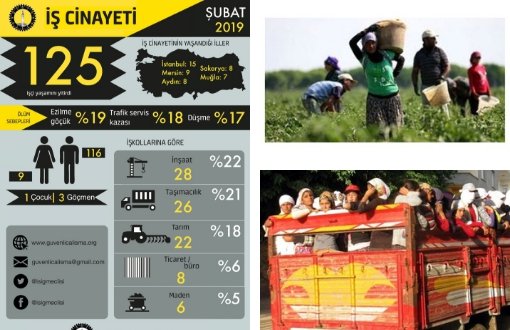
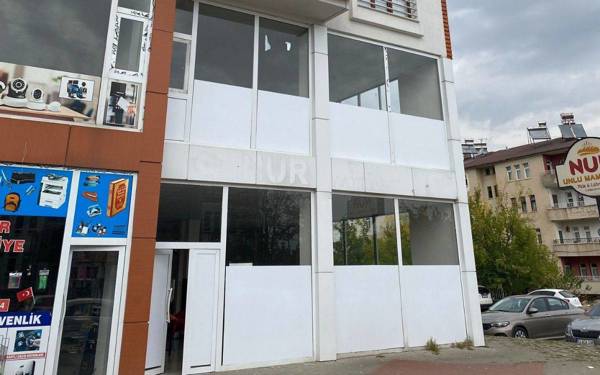
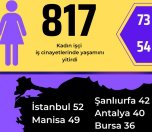
slckdks.jpg)
